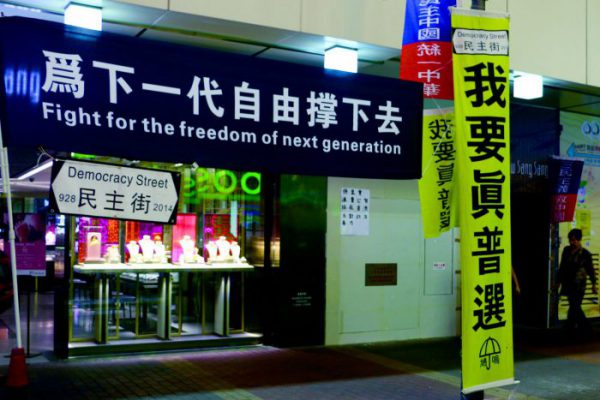More than two thirds of youth support localism but what does it mean to them?
by Chloe Kwan & Stanley Lam
Unlike many of her peers, 17-year-old Sunnie Hung Sum-in does not hanker after leisure and entertainment activities after school work. Instead the year five secondary school student has bigger plans. Most days she is busy organising and promoting the concept of localism to other students. “Secondary school students are the future rulers of Hong Kong. We should push them to care about the issue and build up the national consciousness of the Hong Kong nation,” she says.
It was with this in mind, that Hung and like-minded teenagers set up Studentlocalism in April this year. She says they were influenced by the Umbrella Movement and the Mong Kok Lunar New Year unrest and some had volunteered for localist activities and were impressed by Edward Leung Tin-kei and Ray Wong Toi-yeung.

Studentlocalism aims to promote localism in secondary schools and it currently has around 60 members spread over groups in 21 schools, including the prestigious Wah Yan College on Hong Kong Island and Ying Wa College in Cheung Sha Wan.
Hung and other members of Studentlocalism spend some of their free time setting up street stations and handing out independence-themed fliers to young people in areas like Mong Kok.
“I think related ideas could stay in their minds after reading the flyers, and when they read information shared online. Maybe they’ll want to know more,” she says.
She also tries to spread the message in her own school. Hung founded a localism concern group – which has around seven members – in HKICC Lee Shau Kee School of Creativity. She stuck up posters supporting Hong Kong independence all around the arts and design-oriented school and sprayed graffiti that read “Hong Kong’s Independence” in the staircase in mid-September. At first the school did not take any action.
But Hung says that after receiving advice from the Education Bureau, the school removed the posters and slogan. Earlier, in late August, the government had warned that teachers could be barred from teaching if they promoted separatist ideas in schools. Secretary for Education Eddie Ng Hak-kim said there should not be any independence activities on school campuses as the idea does not comply with the Basic Law.

None of this has deterred Hung and it seems her ideas about localism are indeed widespread among young people. In a survey of 350 people aged between 11 and 27, Varsity looked at young Hongkongers’ views and understanding of localism.
The survey found that close to 69 per cent of the respondents said they supported localist groups, which is higher than suggested in similar previous polls.
Francis Lee Lap-fung, a communications scholar at the Chinese University of Hong Kong (CUHK) is not surprised by the finding.
“In the previous territory-wide polls, localist groups might have an 8 to 9 per cent support rate. It can add up to 40 per cent if respondents are stratified from 18 to 30 years old; we can expect support rate rises with younger respondents,” Lee explains.










































